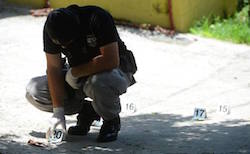Following the two most violent days of the year, authorities in El Salvador are revisiting the idea of enacting a tax to fund security initiatives, as they attempt to overcome years of little state investment in crime prevention.
According to statistics from El Salvador’s National Police (PNC), 42 people were murdered on August 17, making it the most violent day this year, reported El Diaro de Hoy.
This marked the second day in a row a murder record for the year was set: 40 people were killed on August 16, of which 11 were identified as gang members.
The violence provided a fitting backdrop to the announcement by Medardo Gonzalez — Secretary General of the Farabundo Marti National Liberation Front (FMLN) political party — to revisit the possibility of implementing a tax to help fund government security initiatives, reported El Mundo.
These statements were echoed by security commissioner Franzi Hato Hasbun, who said the government has “scarce resources” to implement its newest security strategy “Secure El Salvador,” which the government estimates will cost $2.1 billion over the next five years. Hasbun said officials are exploring ways to acquire financing.
According to El Mundo, debate centers on creating a tax on wealthy businesses, similar to the one enacted in Colombia in 2002 under former President Alvaro Uribe to help fund that country’s fight against guerrilla groups.
InSight Crime Analysis
Secure El Salvador focuses overwhelmingly on preventative violence (i.e., education, job training, etc.), allotting an estimated $1.5 billion for efforts in this area over the next five years. Yet such programs require sustained investment over the long-term, and the Salvadoran government has a poor track record of committing to social spending.
Still, the tax proposal comes during a moment of crisis in El Salvador, perhaps one of the few times such a proposal might even make it through congress. Violence has been steadily building throughout 2015, which may become El Salvador’s bloodiest year since the end of its brutal civil war.
SEE ALSO: El Salvador News and Profiles
The country’s two main street gangs — the MS13 and Barrio 18 — have fueled this carnage, attempting to use violence directed at each other and the security forces to pressure the government to reinstitute a failed gang truce. Security forces have responded in kind, and there is evidence that some members of the police have participated in extrajudicial killings of suspected gang members.
For its part, the government has refused to enter into negotiations with the gangs, and has been scrambling to find a solution to the country’s worsening security situation in both the short and the long term. To this end, a new security tax to help fund the fight against gangs and crime was first proposed in June, and remains a contentious issue among Salvadoran politicians and business leaders.

